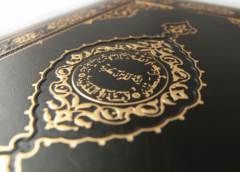
 Asking questions is one of the most important elements of the eloquence which means to say the most appropriate words that the current circumstance requires. Because, a well-timed appropriate question makes the subject explained and proved better and settled in the minds of the people. Also, it impels the collocutor to think about the issue, so, makes him convinced and silent. At this point, the art of interrogation, a literary method which explains the subject by asking questions, proves its own worth.
Asking questions is one of the most important elements of the eloquence which means to say the most appropriate words that the current circumstance requires. Because, a well-timed appropriate question makes the subject explained and proved better and settled in the minds of the people. Also, it impels the collocutor to think about the issue, so, makes him convinced and silent. At this point, the art of interrogation, a literary method which explains the subject by asking questions, proves its own worth.
The eloquent writers classify the interrogation in two parts; first, in terms of terminology and figure of speech.
According to its terminological meaning, “the interrogation means to try to make the subject settled in one’s mind.”
As the figure of speech, “the method of interrogation means to explain the issue by asking question although the answer is known already. In this method, the person who asks the question does not focus on the question. He uses this method for making his explanation much influential.”
In the method of interrogation, the aim is to make the subject understood better, to attract the attention upon a single point and to express the ideas, feelings to the collocutor in such a clear and influential way. Also, in this method it is desired to get the collocutor to understand the subject rather than answering the question.
The Miraculous Qur’an, the Words of Our Lord, is at the most extraordinary and the most brilliant level from the aspect of using the method of interrogation like its magnificent levels in all other methods. The method of interrogation, which assists for explaining the subject by asking questions, was used in almost 1260 verses in the Qur’an, The Miraculous Declaration, for whether proving or convincing or silencing the opponents. If we think that there are totally 6666 verses in the Qur’an, it is understood how high the percentage of using the method of interrogation is and how important this method is.
Here, we will talk about the Method of Rhetorical Interrogation which is one of many parts of the Interrogation Method and we will try to show a few examples from the hundreds of related verses of the Qur’an, like bringing out a few drops from the ocean.
What is the Method of Rhetorical Interrogation?
The first thing to say is that the “rhetorical” does not mean to deny or to curse. The method of rhetorical Interrogation is used for the purpose of explaining the unlawfulness of something to the collocutor and to make him think about his wrongdoings by asking questions. Regarding the method of rhetorical interrogation, the eloquent writers stated that the question that is asked indicates the unlawfulness of the wrongdoings from the aspect of law or custom. They have given this example: By asking the question of “Are you trying to prevent the people passing through the road?” to the one who stopped his car in the middle of the road without any reason, it is aimed to show what he did is unlawful and he must stop behaving like that.
Examples from the Verses
In a verse from the Surat-al Gujarat, there is such an effective method of interrogation, as the meaning of “Do not speak ill of each other behind their backs! Would any of you like to eat the flesh of his dead brother?” , that it was declared how an awful and illogical behaviour is to speak ill behind a Muslim brother and expressed that the person who behave in such a way is in lack of conscience and those ill speaking would bring the unfairness and cruelty to the social life.
Also, the verse of “Can there a doubt about Allah, the Creator of heavens and the earth?” Which Master Bediuzzaman has mentioned in his Treatise of Nature , is a good example for using the Method of Rhetorical Interrogation. It was shown how unwise to doubt about Allah, whose existence and unity is much more certain and definite than the existence of the skies and earth, is shown, by the question of “Can there a doubt about Allah, the Creator of heavens and the earth?” with using the Method of Rhetorical Interrogation.
Besides, in a verse from the Surat-al Baqarah with the meaning of “Do you enjoin right conduct on the people and forget yourselves. And yet you study the Scripture? Will you not understand?” , it is expressed, by asking a literary question to the Israelis some of whom read the Old Testament, are in such an illogical way of life as they advise the right doings to their people but, those advisors carry on doing the unlawful things.
As for the last example; in the Surat-al Rahman, the verse of “Then which of the favours of your Lord will you deny?” which is repeated 31 times, it is expressed that there isn’t any and could be no other benefactor or a helper or a supplier but Our Lord, Allah (SWT) is The Only One that gives all the favours and blessings to genies and human beings and also, expressed that the people who don’t know The Benefactor (SWT) and deny Him (SWT), are the ungrateful ones, with the method of rhetorical interrogation.
- Atik, Ilmu’l-Meani, p.99
- Surat-al Hujurat, 49:12
- Surat-al Ibrahim, 14:10
- The Flashes in Ottoman Language, Risale-i Nur, Said Nursi, Bediuzzaman, p.185
- Surat-al Baqarah, 2:44
- Surat-al Rahman, 55:12

